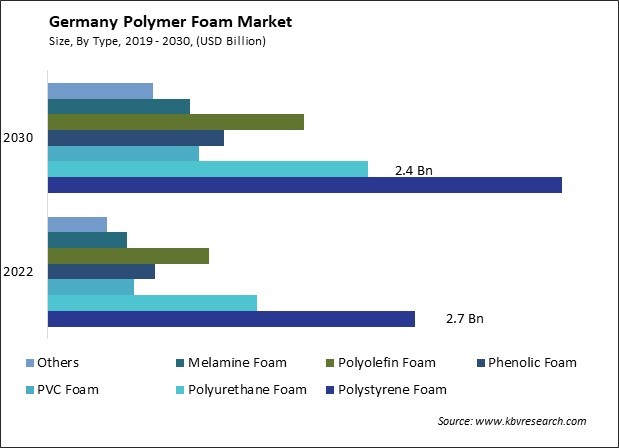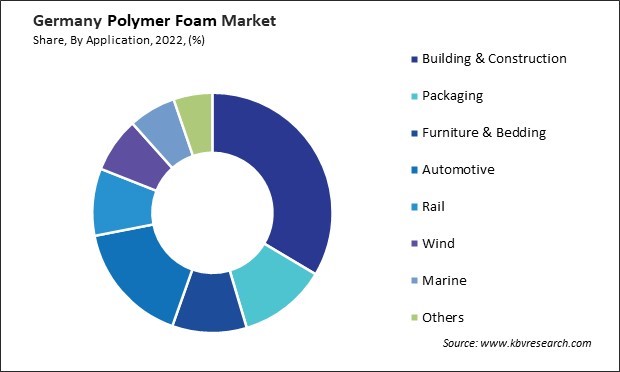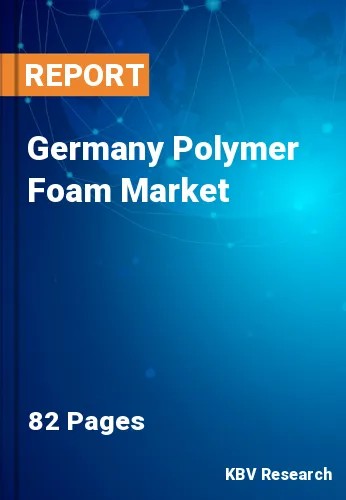The Germany Polymer Foam Market size is expected to reach $12.3 Billion by 2030, rising at a market growth of 5.8% CAGR during the forecast period. In the year 2022, the market attained a volume of 2,470.4 Million Square Meter, experiencing a growth of 5.4% (2019-2022).
The polymer foam market in Germany has witnessed significant growth and transformation over the years. This versatile nature of polymer foams has contributed to their widespread adoption and expansion in the German industry. The construction industry is another key contributor to the polymer foam market in Germany. According to the Federal Ministry of the Interior and Community, in 2019, Germany's construction industry generated an output of roughly €430 billion. As sustainability and energy efficiency become increasingly important in construction practices, the demand for polymer foams as insulation materials has steadily grown. Moreover, the ongoing trend towards green building construction has led to developing eco-friendly polymer foam solutions, further driving industry expansion.

One of the primary drivers of the polymer foam market in Germany is the automotive industry. Polymer foams are extensively used in automotive applications to reduce weight, enhance fuel efficiency, and improve overall vehicle performance. According to the Germany Trade & Invest, German automobile manufacturers produced over 15.6 million vehicles in 2021. With Germany being a global hub for automotive manufacturing and innovation, this sector's demand for polymer foams remains robust. Additionally, stringent regulations to reduce carbon emissions have further propelled the adoption of lightweight materials like polymer foams in the automotive industry.
However, the COVID-19 pandemic has significantly impacted the polymer foam market in Germany, disrupting supply chains and causing fluctuations in demand across various end-use industries. The pandemic-induced lockdowns and restrictions led to temporary closures of manufacturing facilities and disruptions in logistics and transportation, affecting the production and distribution of polymer foam products. Moreover, the economic uncertainty resulting from the pandemic has led to fluctuations in consumer spending and investment decisions, further impacting the demand for polymer foams in sectors such as automotive, construction, and consumer goods.
The e-commerce sector's influence on Germany's polymer foam market has been profound, reshaping traditional consumption patterns and driving significant growth. One of the primary drivers of the e-commerce surge in the polymer foam market is the convenience it offers to German consumers. With just a few clicks, customers browse a wide array of polymer foam products, compare prices, and purchase without leaving their homes. Moreover, the e-commerce model facilitates better accessibility to a diverse range of polymer foam products. Small and medium-sized enterprises (SMEs) reach a broader audience without needing a physical storefront, leveling the playing field against larger competitors.
According to the International Trade Administration, in 2022, the e-commerce industry in Germany experienced robust growth, with total sales estimated at USD 141.2 billion, representing an impressive 11% increase compared to 2021. In 2022, the industry's online presence in Germany soared to a substantial 80%, securing its place as the third highest globally in terms of online industry penetration. This convenience factor has propelled online sales of polymer foam products, especially for packaging materials, mattresses, and insulation products.
Furthermore, e-commerce platforms leverage data analytics and personalized marketing strategies to effectively target German consumers, driving sales and brand loyalty. Customer feedback and reviews are crucial in shaping purchasing decisions and fostering trust and credibility within the online marketplace. Therefore, the e-commerce revolution in Germany's polymer foam market is driven by convenience, accessibility, and personalized marketing, reshaping traditional consumption patterns and fueling significant growth.
The polymer foam market in Germany has witnessed a notable surge in demand for melamine foam, owing to its versatile properties and diverse applications across various industries. Melamine foam, a type of thermoset polymer, is renowned for its exceptional sound-absorbing, flame-retardant, and thermal-insulating characteristics. These unique properties have propelled its popularity in the polymer foam market in Germany, where stringent regulations and a strong emphasis on sustainability drive innovation.
One of the primary drivers behind the rising demand for melamine foam is its unparalleled sound absorption capabilities. With increasing urbanization and industrialization in Germany, noise pollution has become a pressing concern. Melamine foam's open-cell structure allows it to trap and absorb sound waves effectively, making it an ideal material for acoustic insulation in buildings, transportation vehicles, and industrial machinery. Moreover, melamine foam's flame-retardant properties make it highly desirable for applications where fire safety is paramount. As Germany places significant importance on safety standards and regulations, the adoption of flame-retardant materials like melamine foam has surged in various sectors.
Additionally, melamine foam's thermal insulating properties have contributed to its growing demand in the German polymer foam market. By effectively reducing heat transfer, melamine foam helps enhance energy efficiency in buildings and appliances, aligning with Germany's focus on sustainability and environmental conservation. Hence, melamine foam's exceptional sound absorption, flame-retardant capabilities, and thermal insulation properties have propelled its significant surge in demand within the German polymer foam market, aligning with the country's emphasis on sustainability and stringent safety regulations.

The polymer foam market in Germany is a robust and innovative sector characterized by a diverse range of companies catering to various industries and applications. One prominent player in the German polymer foam market is BASF SE, a global leader in chemical manufacturing and materials science. BASF offers a comprehensive portfolio of foam solutions, including expanded polystyrene (EPS), extruded polystyrene (XPS), and polyurethane (PU) foams, serving industries such as construction, automotive, and packaging. The company's foam products are known for their superior thermal insulation properties, lightweight construction, and environmental sustainability, aligning with Germany's focus on energy efficiency and green technologies.
Another key player in the German polymer foam market is Covestro AG, a leading supplier of high-performance polymers and foam materials. Covestro's foam portfolio includes polyurethane (PU) foams, polycarbonate (PC) foams, and polyurethane rigid foam systems, serving applications in automotive interiors, insulation, and furniture. Leveraging its expertise in polymer chemistry and engineering, Covestro develops innovative foam formulations with enhanced fire resistance, mechanical strength, and sustainability features, meeting the stringent requirements of German manufacturers and global industries.
Evonik Industries AG is also a significant player in the German polymer foam market, specializing in specialty chemicals and foam additives. The company's foam products encompass acrylic foam additives, specialty blowing agents, and foam stabilizers, enhancing polymer foams' performance and processing characteristics. With a focus on research and development, Evonik collaborates with foam manufacturers to optimize foam formulations for specific applications, achieving superior properties such as thermal insulation, sound absorption, and flame retardancy.
Furthermore, Germany hosts a thriving ecosystem of small and medium-sized enterprises (SMEs) specializing in niche foam materials and technologies. These companies leverage their agility and technical expertise to develop customized foam solutions for specialized industries or customer requirements. For instance, FoamPartner Group manufactures specialty foam products for medical devices, transportation seating, and acoustic insulation, offering tailored solutions with exceptional comfort, durability, and performance.
Moreover, Germany's polymer foam market benefits from collaboration between industry players, research institutions, and government agencies to drive innovation and sustainability. Initiatives such as the Fraunhofer Institute for Chemical Technology (ICT) and the German Plastics Center (SKZ) promote research and development in foam materials, processing technologies, and recycling methods to address key industry challenges, including resource efficiency and circular economy principles. Hence, the polymer foam market in Germany is characterized by a diverse array of companies offering a wide range of foam products tailored to various applications and industries.
By Type
By Application
Our team of dedicated experts can provide you with attractive expansion opportunities for your business.

